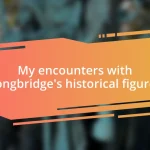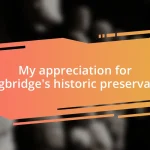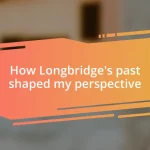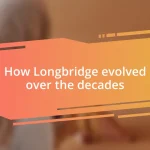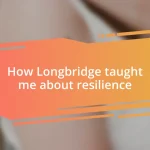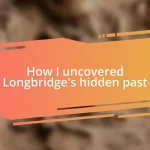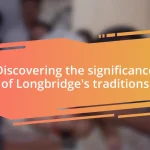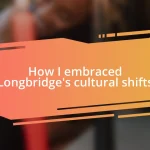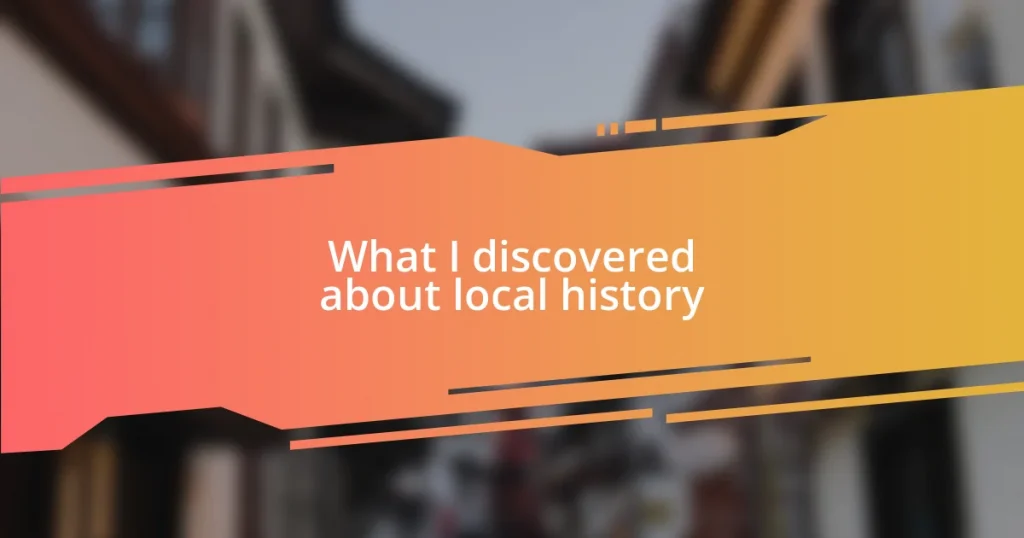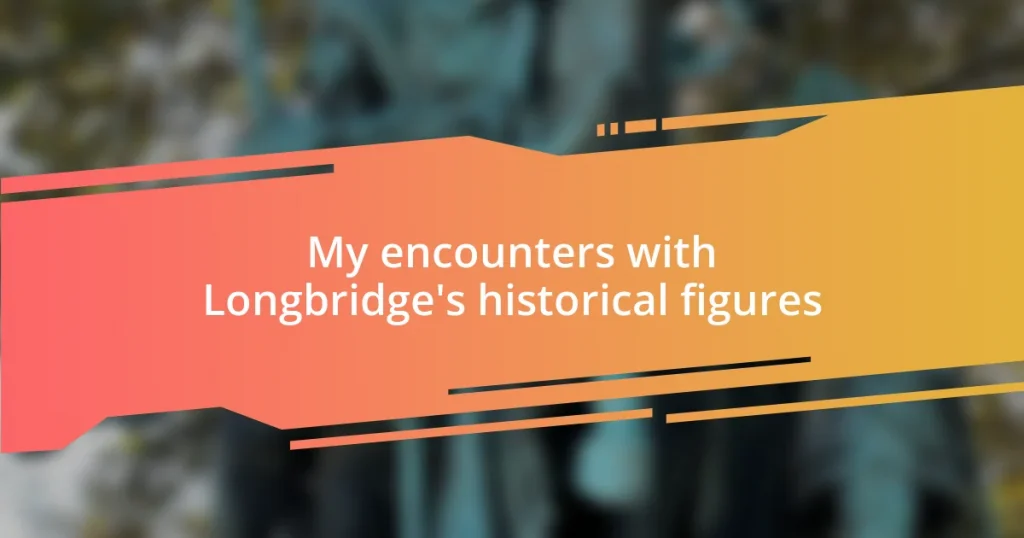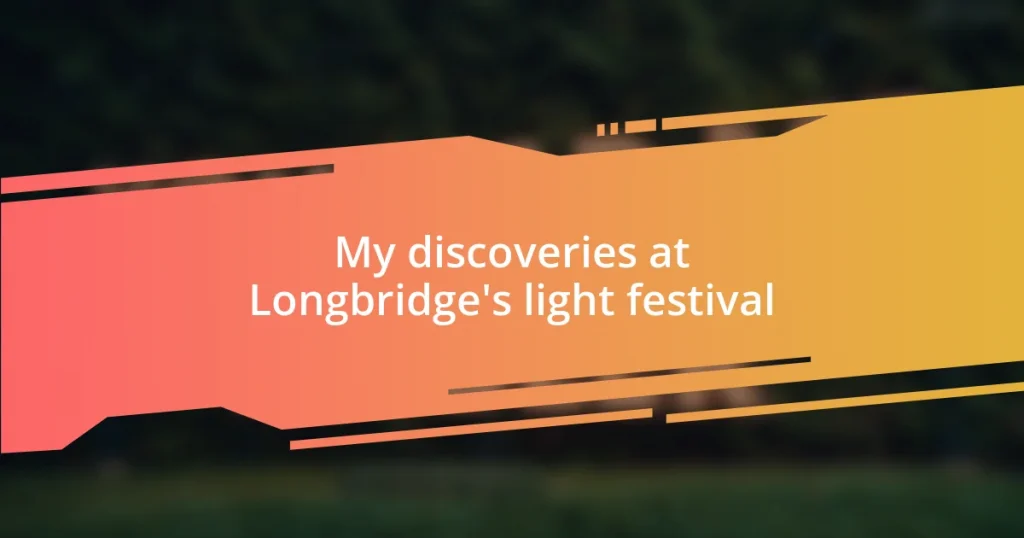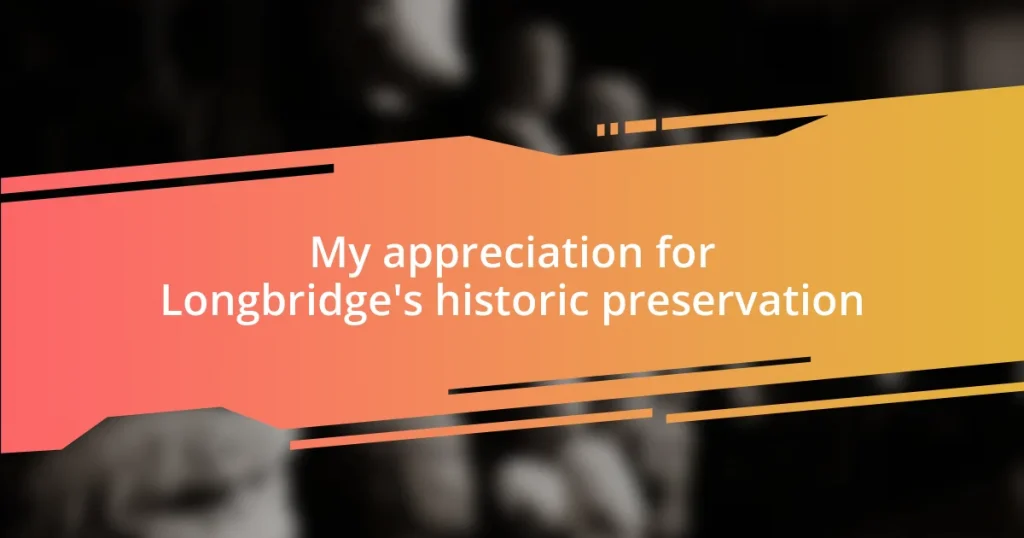Key takeaways:
- Understanding local history fosters community pride and identity, connecting residents through shared narratives and experiences.
- Researching local history through archives, community engagement, and digital resources enhances appreciation for the past and its relevance today.
- Preservation of local history for future generations involves creating accessible archives and encouraging community involvement to celebrate and safeguard cultural heritage.
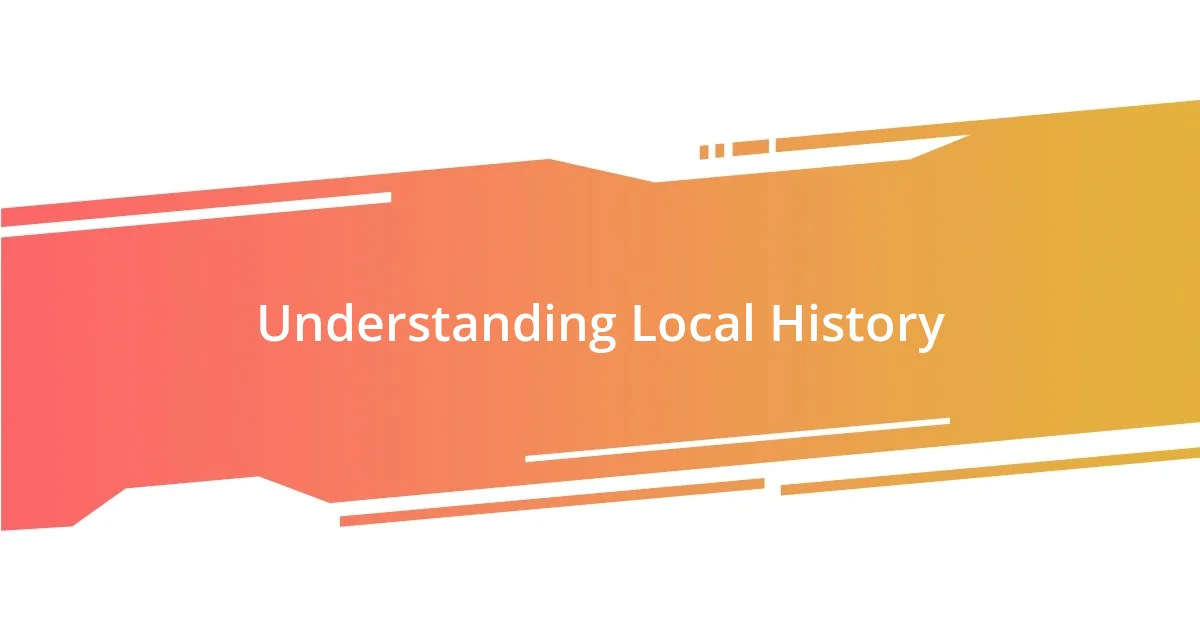
Understanding Local History
Understanding local history is like peeling back layers of an onion, where every layer reveals intriguing stories and forgotten events. I remember visiting an old library in my hometown and stumbling upon a dusty book that chronicled the lives of early settlers. It felt as if I was holding a piece of their lives in my hands, which made me wonder, how many untold tales of struggle and triumph exist in our neighborhoods?
As I delved deeper into my town’s history, I discovered the significant role local communities played in broader historical movements. For instance, learning that my own town had been a sanctuary during a tumultuous era brought a swell of pride and an emotional connection to the place I call home. How often do we overlook the impact of our own community in the grand narrative of history?
Reflecting on these discoveries, I realize that understanding local history isn’t just an academic exercise; it’s a pathway to knowing ourselves and our roots. Have you ever felt that moment of connection while uncovering a local story? That revelation can be incredibly powerful, as it weaves a tapestry of shared experiences that bind us together in the present.
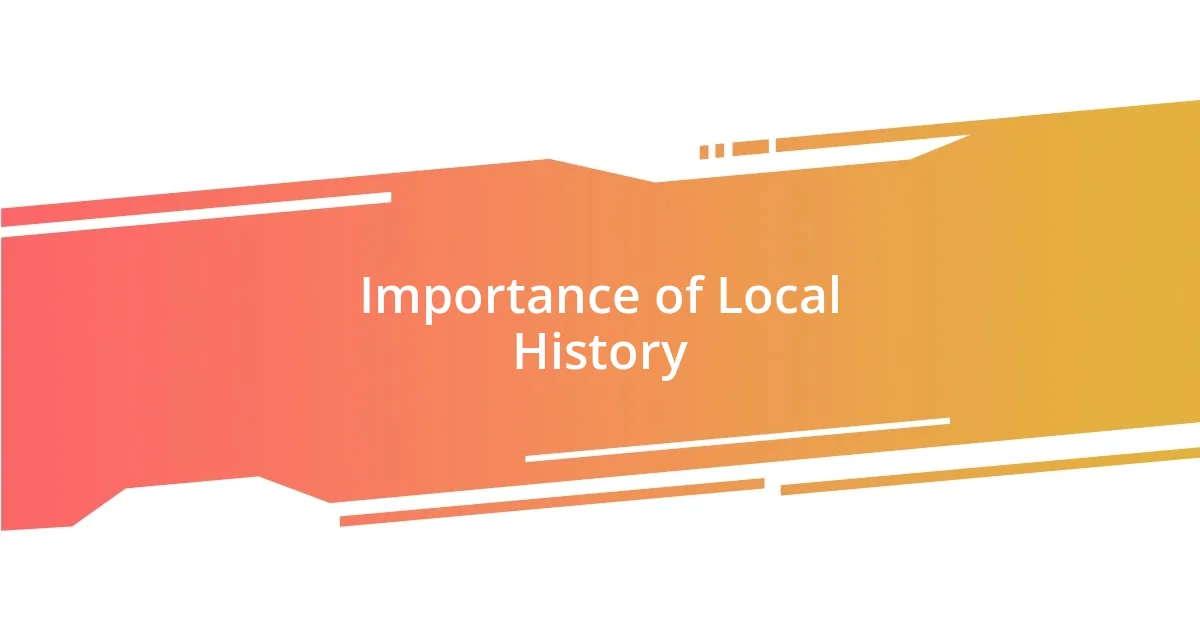
Importance of Local History
Exploring local history cultivates a sense of community identity. I remember attending a town hall meeting where locals passionately shared stories of their families and traditions. It struck me how these shared experiences create bonds among residents, reminding us that we are part of something much larger than ourselves.
The importance of local history can be summarized in a few key points:
- It fosters community pride by showcasing the unique stories and contributions of its members.
- Understanding local events and figures can influence the present and shape future developments.
- Local history helps preserve cultural heritage, ensuring that future generations can learn from the past.
- It creates connections between neighbors, enriching the community through shared narratives.
- Discovering local history can inspire civic engagement and a desire to protect regional identity.
Every time I learn something new about my town’s past, I feel that spark of reawakening within, as if the stories of those who walked before us are urging us to craft a more vibrant future together.

Methods to Research Local History
To research local history effectively, I’ve found that visiting local archives and libraries can be incredibly rewarding. I still remember the thrill of unearthing old newspapers—each article was like a time capsule, filled with vivid snapshots of life in my town decades ago. Have you ever sat in a quiet corner of a library, lost in tales of your own community? It’s a uniquely humbling experience that deepens one’s connection to the place we live.
Another method I’ve enjoyed is engaging with local historians and community groups. During a recent meet-up with a historical society, I was captivated by the stories shared by long-time residents. They spoke of an influence that still resonates today, like ripples through time, and their passion was infectious. It’s fascinating how a simple conversation can transform your perspective on local events and individuals—would you ever have imagined the person next door had a crucial part in your town’s history?
Lastly, I recommend exploring online databases and historical websites, which can sometimes reveal astonishing finds. I once stumbled upon a digital collection of photographs that showcased my town’s evolution over the years. Seeing familiar streets from a different era sparked so many questions in my mind about how our environment shapes our identity. Isn’t it incredible how technology gives us access to these hidden gems?
| Research Method | Details |
|---|---|
| Archives and Libraries | Provide primary sources like newspapers, books, and documents; great for primary research. |
| Community Engagement | Involves chatting with locals and historians; helps uncover personal anecdotes and untold stories. |
| Online Databases | Offer digital collections and resources; excellent for accessing historical images and documents easily. |
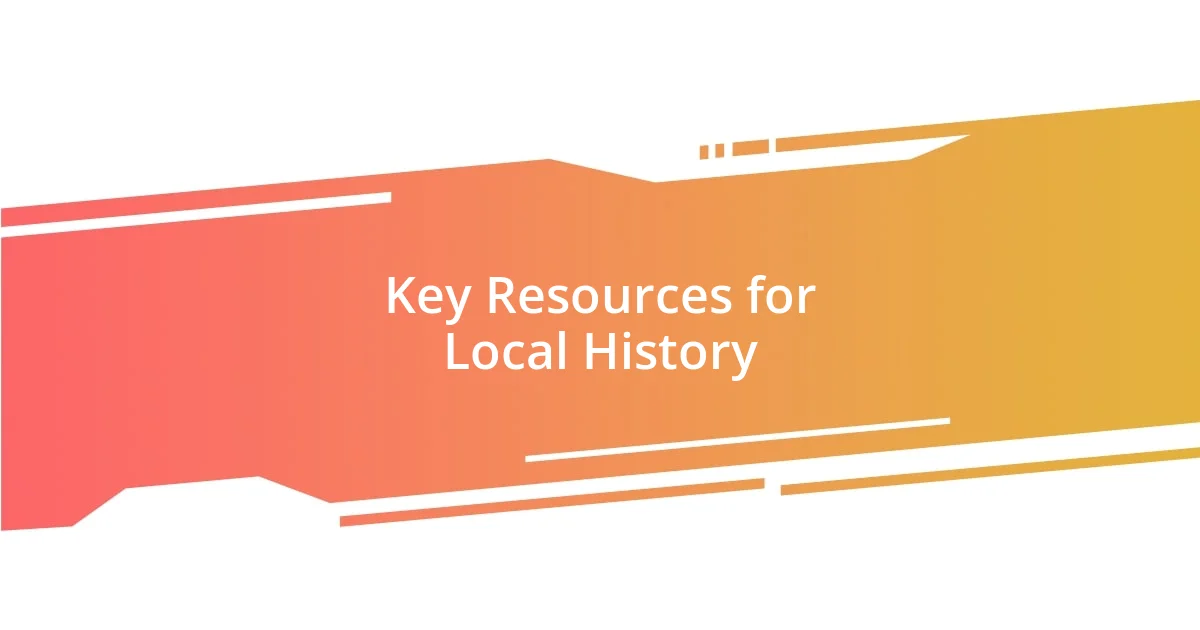
Key Resources for Local History
When I think about key resources for local history, I can’t help but highlight local museums. During one visit, I was captivated by an exhibit featuring artifacts from my town’s early settlers. Each piece told a story, and it made me wonder, how often do we consider the everyday objects that shape our lives? Museums provide tangible connections to the past, creating a bridge between generations that enriches our understanding of who we are today.
Additionally, I highly recommend checking out local historical societies. I remember attending one of their monthly meetings where they showcased research on a famous local figure. The enthusiasm in the room was contagious, and it sparked an idea in me: wouldn’t it be fascinating to explore our local legends together? Engaging with these societies opens up a treasure trove of knowledge and often leads to deeper discussions about community values and identity.
Lastly, don’t underestimate the power of social media groups dedicated to local history. I joined one a few years ago, and the experience has been delightful. Sharing old photographs and stories with others who share the same passion creates a sense of camaraderie. Have you ever posted a question about a historical landmark only to receive enlightening responses that challenge your previous understanding? It’s amazing how digital connections can enhance our grasp of local history, making it feel vibrant and alive.
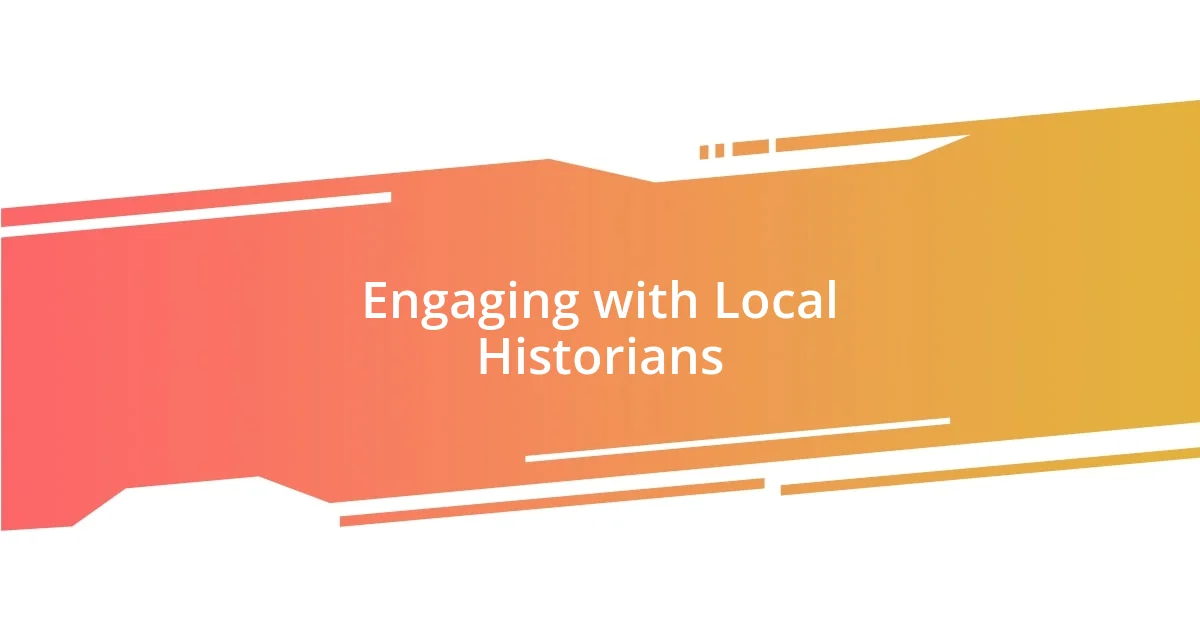
Engaging with Local Historians
Engaging with local historians can be one of the most enriching experiences on your journey of historical discovery. I remember sitting at a quaint café, chatting with a local historian who had dedicated decades to unearthing the stories of our town. The way their eyes lit up when sharing tales of community resilience during tough times was genuinely inspiring. Have you ever felt a deep connection with a person through shared stories? That moment reminded me how history isn’t just facts and dates; it’s the human experience woven into our collective memory.
I’ve also found that participating in workshops led by local historians can be eye-opening. During one such event, we analyzed historical maps and learned so much about how geographical changes affected the town’s identity. I left the workshop with a new appreciation for the spaces we often take for granted. Isn’t it fascinating how understanding the lay of the land can shift your perspective on your own neighborhood? These workshops don’t just provide information; they spark a sense of community as we all dive into the past together.
As I’ve engaged more with local historians, I’ve begun to realize how essential their work is in preserving our narratives. At a community forum, I encountered stories of struggles and triumphs that shaped my hometown, each reflecting the spirit of resilience. It made me wonder, how many precious stories remain untold, waiting for someone to uncover them? The insights shared by local historians can be transformative; they remind us that our history is not just a series of events but a tapestry of lived experiences that continue to affect us today.
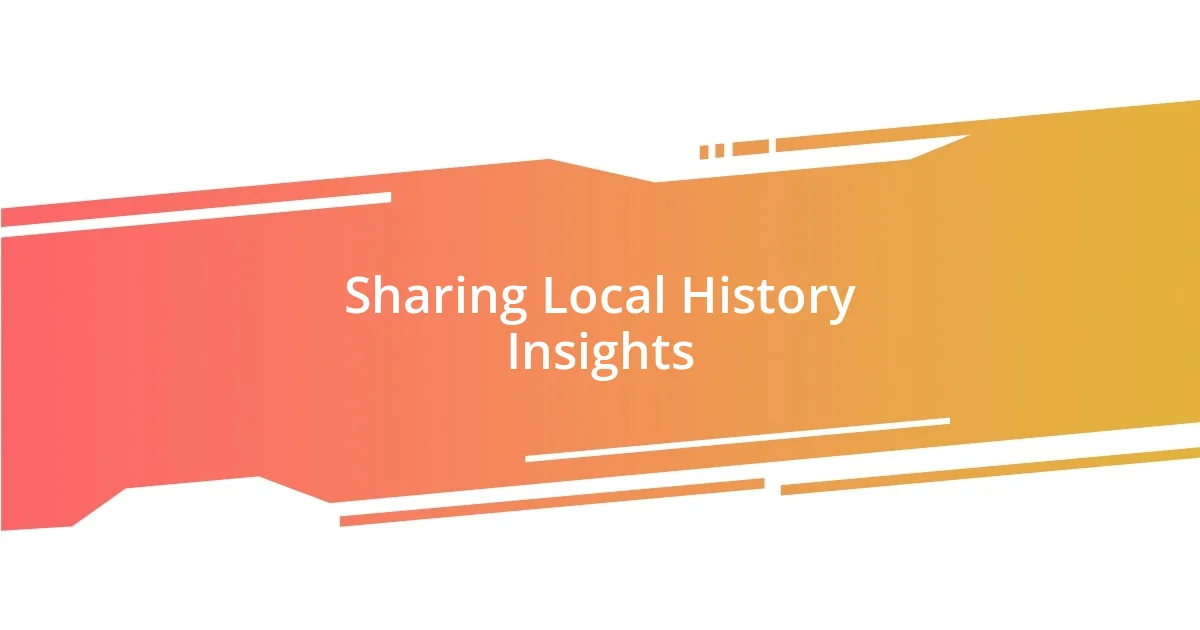
Sharing Local History Insights
Sharing insights about local history can feel like unearthing buried treasure. I once stumbled upon an old diary at a historical archive that belonged to a town founder. The way their words painted a vivid picture of daily life and aspirations truly moved me. Have you ever read something that transported you to another time? That diary did just that, reminding me how personal narratives can breathe life into dusty dates and milestones.
When I go to community events where local history is shared, I can honestly say there’s an electric atmosphere. Just last summer, I attended a storytelling night where residents recounted experiences from the town’s early days. Each tale was uniquely personal, but collectively, they shaped our town’s identity. Do you ever feel the pulse of history come alive in shared stories? Those evenings reaffirmed for me how our local history isn’t just about the past; it’s a living, breathing entity that connects us all.
Making history accessible is essential, and I’ve seen firsthand the impact of organizing small group discussions. A few months ago, I led a session at my library where participants brought family artifacts to share. It turned into a heartfelt exploration of each item’s significance, accompanied by laughter and nostalgia. Isn’t it incredible how physical objects can evoke powerful memories? This experience deepened my appreciation for our multifaceted histories and underscored the importance of sharing these moments with one another.
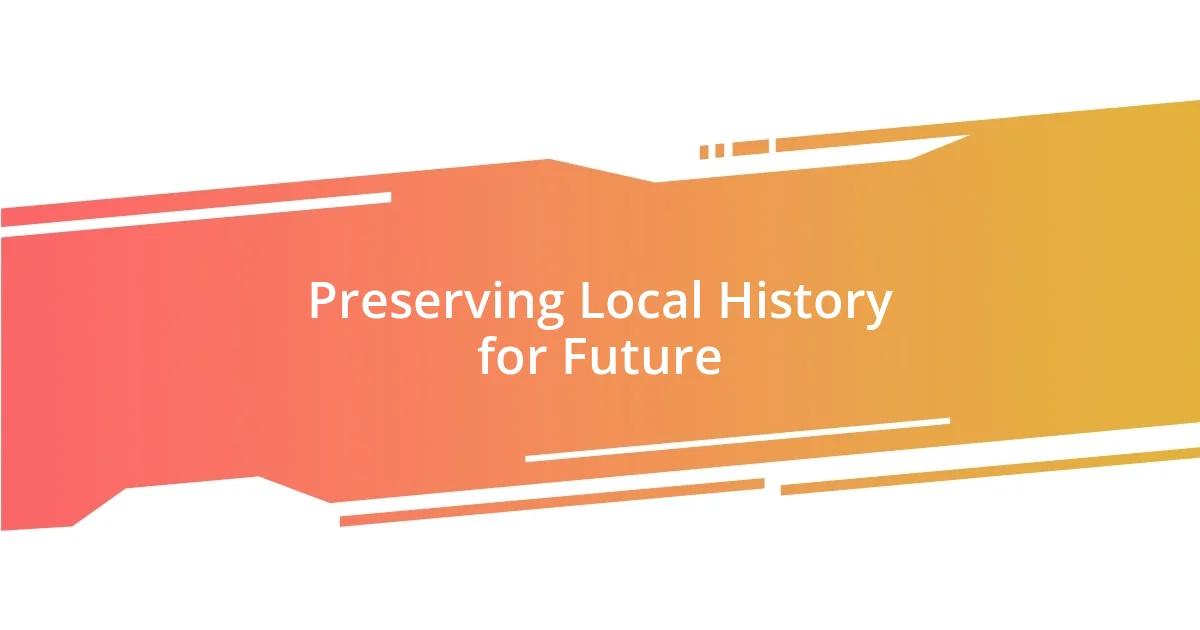
Preserving Local History for Future
Preserving local history for the future is not just an act of maintaining records; it’s about curating the essence of a community. I recall volunteering at my town’s historical society, where I helped catalog old photographs and documents. Each item sparked a rush of nostalgia, transporting me to a time when life seemed simpler yet filled with profound stories. Have you ever stumbled across an old photo that made you pause and reflect on the lives it captured? It’s these moments that remind us of the importance of safeguarding our heritage for generations to come.
I’ve learned the significance of creating accessible archives that resonate with both longtime residents and newcomers. One summer, I assisted a local librarian in digitizing oral histories from elders in our community. Hearing their voices recount cherished memories was magical. I wondered: how can we ensure these invaluable stories are heard by future generations? By digitizing these narratives, we’re not only protecting them from fading away but also fostering a deeper connection between past and present.
Community involvement plays a crucial role in this preservation journey. I remember organizing a “History Day” event in my neighborhood, inviting families to share artifacts and stories. Witnessing kids excitedly interact with history made my heart swell. How amazing is it to think that these young minds are shaping the future while learning about their roots? By nurturing that curiosity, we can empower future generations to value and continue our history, ensuring it lives on vibrantly in their hearts.
